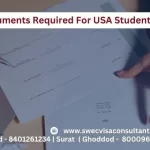When applying for a UK Student Visa, one of the most critical aspects of your application is proving that you have sufficient financial resources to support yourself during your studies. Financial documents, especially your bank statement, play a pivotal role in demonstrating your ability to meet the UKVI (UK Visas and Immigration) requirements. The UK government wants to ensure that students can cover tuition fees, living expenses, and other costs during their stay. Failure to provide accurate financial documentation can result in delays or even a visa refusal.
But what exactly are the financial documents required, and how do you ensure they are in the right format and meet all the guidelines? Read on to discover everything you need to know about handling financial documents and bank statements for your UK Student Visa application.
Importance of Financial Documentation
Providing accurate financial documentation is essential for securing a UK Student Visa. The UKVI needs to be sure that you can cover the costs associated with your education, including tuition fees and living expenses. A complete and well-documented financial record is crucial for ensuring your application is approved quickly. Any discrepancies or missing documents can lead to unnecessary delays or refusal.
Need help with your financial documentation? Contact SWEC Visa experts to ensure everything is in order!
What Financial Documents are Required for a UK Student Visa?
Navigating the financial documentation for your UK Student Visa application can seem overwhelming, but understanding each requirement will make the process smoother. Here’s a breakdown of the essential documents:
Bank Statement: The Key Document
A bank statement is one of the most critical documents in proving your financial capability for a UK Student Visa. It helps UKVI confirm that you have sufficient funds to cover your tuition fees and living expenses during your time in the UK. Here’s what you need to know:
- Minimum Funds Required:
As a student, you must prove you have the following funds available:- £1,334 per month for living expenses if studying outside London.
- £1,023 per month for living expenses if studying inside London.
- You must also show that you can cover your tuition fees (which can range from £11,000 to £35,000 or more, depending on your course).
- 28-Day Rule:
UKVI requires that the bank statement shows the required funds have been in your account for at least 28 consecutive days before you apply. This ensures the funds are not temporarily borrowed or transferred. - UKVI Accepted Bank Statement Format:
For your bank statement to be recognized by UKVI, it must:- Be an original document (scanned or photocopies are not accepted).
- Be printed on official bank letterhead, showing your account number, the bank’s name, and the statement period.
- Display the currency (GBP) and the minimum required funds.
- Include the bank’s stamp or official endorsement if it’s a printout.
Official Financial Sponsorship Letters (If Applicable)
If a third party, such as a family member or a scholarship provider, is sponsoring your education, they must provide an official sponsorship letter. This letter should clearly state:
- The amount of money they are willing to contribute.
- A statement confirming that they are responsible for your financial support.
- Documentation proving their ability to provide the funds (e.g., bank statements, salary slips, etc.).
Proof of Previous Savings
If you have saved up over time for your education, showing these accumulated savings can boost your application. The UKVI will want to see the history of these savings through:
- Recent bank statements.
- Evidence that these savings have been consistently in your account, ensuring they are not a recent deposit.
Education Loan Documents
In cases where you are taking out an education loan to fund your studies, make sure to include the following:
- A loan sanction letter from the financial institution stating the approved amount.
- Details of repayment terms, interest rate, and duration.
This shows UKVI that your finances are well-planned and that you have a clear strategy for managing your debt.
Financial Guarantee from a Sponsor
A financial sponsor (such as a parent or guardian) must provide a guarantee to fund your stay in the UK. The sponsor must submit:
- A guarantee letter clearly stating their commitment to support you financially.
- Supporting documents like bank statements or pay slips to prove they can meet the required financial standards.
Additional Documents (If Applicable)
Additional documents that can support your financial application include:
- Tax returns or pay slips to show ongoing income.
- Property ownership documents if you are using assets as proof of financial stability.
Confused about the right financial documents for your UK Student Visa? Contact SWEC Visa for personalized guidance!
Requirements for the Bank Statement in a UK Student Visa Application
When applying for a UK Student Visa, one of the most important documents you’ll need to submit is your bank statement. This statement serves as proof that you have enough funds to cover your living expenses and tuition fees while studying in the UK. Failing to meet UKVI’s (UK Visas and Immigration) financial requirements can lead to delays, complications, or even a refusal of your visa. Let’s break down the essential requirements for your bank statement.
Minimum Funds Required: A Detailed Breakdown
The UK government requires you to demonstrate that you have sufficient funds to support yourself during your studies. Here’s the breakdown:
- Living Expenses:
- £1,334 per month for living expenses if you are studying outside London.
- £1,023 per month for living expenses if you are studying inside London.
These amounts are based on the assumption that you will be staying in student accommodation or similar.
- Tuition Fees:
- You must show that you have enough funds to cover your tuition fees. Tuition fees for international students in the UK generally range from £11,000 to £35,000, depending on the course and university. Be sure to check your specific course’s fee structure.
Currency and Account Type
When it comes to currency, the UKVI primarily requires the funds to be in GBP (British Pounds). Here’s what you need to consider regarding the account type and currency:
- Currency: The funds must be in GBP or an equivalent amount in your local currency. If your bank statement is in a different currency, it should be clear how much it equates to in GBP, with a clear currency conversion.
- Account Type: UKVI accepts both checking and savings accounts as long as they meet the requirements. Some types of accounts (like certain student accounts) may not be considered acceptable, so check with your bank to ensure your account type qualifies.
Document Formatting
For your bank statement to be accepted by UKVI, it must meet specific formatting standards:
- Official Letterhead: The bank statement must be printed on the bank’s official letterhead, which includes the name of the bank, address, and contact details.
- Bank Stamp or Endorsement: The statement must be stamped or officially endorsed by the bank to validate its authenticity. Scanned or photocopied documents will not be accepted unless they are certified.
- Clear Currency Conversion: If your account is in a currency other than GBP, ensure that the bank statement clearly shows the conversion to GBP, with the applicable exchange rate.
The 28-Day Rule
One of the most crucial aspects of your bank statement is the 28-Day Rule:
- UKVI requires that the funds must have been in your account for at least 28 consecutive days immediately before you apply for your visa. This rule ensures that the money is not a temporary deposit and that you have consistent financial support.
- If the funds were added within this period, you will need to show additional documentation explaining the deposit. The 28-day period can’t be broken by any withdrawals, so plan your finances carefully.
Accepted Bank Statements
UKVI accepts bank statements from both UK and international banks, as long as they meet the required criteria. Some important considerations include:
- UK Banks: Statements from UK-based banks are straightforward as long as they are printed on official letterhead and meet the formatting and fund requirements.
- Non-UK Banks: International banks can also provide statements, but they must meet the same criteria. It is advisable to contact your bank early to ensure they can provide a statement in the correct format, with clear details of currency conversion.
Proof of Funds for Family or Sponsors
If your finances are being supported by a family member or sponsor, additional documentation is required:
- Sponsorship Letters: A formal letter from the sponsor confirming their financial support and the amount they will provide.
- Sponsor’s Bank Statements: The sponsor must provide their bank statements, showing they have sufficient funds to support you. These must meet the same criteria as your bank statements, including the 28-day rule and official bank formatting.
- Affidavits or Legal Documents: In some cases, an affidavit or legal document may be needed to confirm the sponsorship and the sponsor’s financial ability.
Need help ensuring your bank statement meets UKVI standards? Get in touch with SWEC Visa to avoid any errors!
Common Mistakes to Avoid When Submitting Financial Documents
Submitting financial documents for your UK Student Visa can be tricky. Here are some common mistakes applicants make—and how you can avoid them.
Insufficient Funds
One of the most common mistakes is not meeting the financial requirements. You need to show that you have:
- Sufficient living expenses (£1,334 or £1,023 per month depending on location).
- Full tuition fees for your course.
What to Do: Ensure your bank statement includes the required amount and is from an account that is eligible under UKVI guidelines. Double-check the amounts for both tuition and living expenses.
Incorrect Bank Statements
Banks sometimes make errors that can lead to issues with your application. Common problems include:
- Missing bank stamps or signatures.
- Incorrect dates on the bank statement.
- Unclear currency conversions if the account is in a foreign currency.
What to Do: Always verify that the bank statement is printed on official bank letterhead, includes a clear stamp, and shows the correct dates and amounts in GBP or with a clear conversion.
Not Following the 28-Day Rule.
Submitting a bank statement that doesn’t meet the 28-day rule is a serious mistake. If your funds haven’t been in your account for at least 28 consecutive days before you apply, your visa may be refused.
What to Do: Ensure that the funds have been in your account for at least 28 days before applying. If necessary, wait to submit your application until the 28-day period is complete.
Lack of Clear Documentation from Sponsors
If a sponsor is supporting you, unclear or incomplete documentation can lead to visa delays or refusals. Make sure the sponsor provides:
- A clear sponsorship letter.
- Full bank statements showing the required funds.
- Additional affidavits or legal documents confirming the sponsorship.
What to Do: Request that your sponsor provides a formal, clearly written letter along with any supporting documents (e.g., bank statements, pay slips) to prove they can meet the financial requirements.
Not Providing Additional Documents
Sometimes applicants fail to submit additional documents like pay slips, loan sanction letters, or property documents that can strengthen their case. Missing documents can lead to delays in processing.
What to Do: Ensure you submit all the necessary documents, including any additional proof of income or funds from a sponsor, loan documents, or savings.
Avoid these common pitfalls! Let SWEC Visa guide you through the process to ensure your documents are flawless.
How to Prove Financial Stability with Non-Bank Documents
If you don’t have sufficient funds in a bank account, there are other ways to prove financial stability for your UK Student Visa application. The UKVI accepts various types of financial documents, provided they meet the specified guidelines. Below are some alternatives and how you can use them effectively.
Educational Loans
Educational loans are a widely accepted form of financial proof for UK Student Visa applications. Here’s what you need to know:
- Loan Sanction Letter: This letter from the financial institution must clearly state the approved loan amount, the purpose (education), and the repayment terms.
- Repayment Terms: Ensure the document includes clear repayment details, as it helps demonstrate your financial planning.
- Disbursement Details: Provide information about when and how the loan will be disbursed.
Pro Tip: Ensure the loan is sanctioned by a recognized financial institution and is specifically for educational purposes.
Income Proof
Your income documents can also support your visa application by demonstrating your ability to sustain yourself financially.
- Pay Slips: Submit recent pay slips (usually for the last 3-6 months) from a recognized employer.
- Tax Returns: Provide copies of your most recent income tax returns to show consistent earnings.
- Employment Verification Letter: A letter from your employer stating your role, salary, and financial stability can strengthen your case.
When to Use: This method is particularly useful for applicants who are working professionals or receiving financial support from working family members.
Scholarships and Financial Aid
Scholarships and grants are another excellent way to prove financial stability. UKVI recognizes these as valid forms of funding if the documentation is complete.
- Scholarship Award Letter: This document must mention the amount awarded, its duration, and the expenses it covers (e.g., tuition, and living costs).
- Financial Aid Proof: If receiving grants or aid, ensure the documents specify the institution providing the funds and their purpose.
Important Tip: Ensure that the scholarship covers the required minimum amount for your visa application. If it does not, combine it with other financial proof.
Other Assets
In some cases, non-liquid assets like property or investments can be used to demonstrate financial capability.
- Property Documents: Provide proof of ownership along with a valuation certificate from a certified professional.
- Investment Statements: Submit statements for fixed deposits, mutual funds, or other investments showing their value in GBP or a converted amount.
- Affidavits of Ownership: Include notarized affidavits proving that the assets belong to you or your sponsor.
Limitations: Non-liquid assets alone may not suffice as proof of funds but can supplement other documentation.
Not sure how to present alternative financial proof? SWEC Visa can help you organize all your documents!
How to Handle the Financial Requirements for Different Types of Students
Different types of students may have unique financial requirements for their UK Student Visa. Here’s a detailed breakdown:
Full-Time Students
Full-time students often need to show a more comprehensive financial plan, whether self-funding or receiving external financial support.
- Self-Funding: Provide personal bank statements showing the required funds for tuition and living expenses.
- Parents or Guardians: Submit their bank statements along with a sponsorship affidavit confirming their financial support.
- Educational Loans or Scholarships: Include all supporting documents, as outlined earlier, to demonstrate how tuition and living costs will be covered.
Key Point: Full-time students must meet the minimum financial requirements outlined by UKVI for living expenses and tuition.
Part-Time Students
Part-time students may face different challenges, as they are often ineligible for work opportunities in the UK during their studies.
- Financial Stability: Show evidence of pre-arranged funds for the entire duration of your course.
- Living Expenses: Even as a part-time student, you must meet the minimum living cost requirements for the city where you will be studying.
- Restricted Work Options: Ensure your financial documents reflect your ability to sustain yourself without relying on part-time work.
Important: Check the specific rules for part-time students, as they may vary depending on the course and institution.
Dependent Family Members
If you are applying with dependents (spouse, children), additional financial proof is required.
- Additional Living Costs: You must demonstrate funds for each dependent:
- £845 per month for dependents outside London.
- £680 per month for dependents inside London.
- Dependent Sponsorship: If a sponsor is covering the dependents’ costs, submit their financial documents along with a detailed sponsorship letter.
Tip: Dependents’ financial proof must cover their expenses for the same 28-day period as yours.
Undergraduate vs. Postgraduate Students
The financial requirements may differ slightly based on the level of study:
- Undergraduate Students: Typically, undergraduates have higher living expenses as they may reside in university accommodations or larger cities. Bank statements or parental sponsorship letters are common forms of proof.
- Postgraduate Students: Scholarships, fellowships, or employer sponsorships are more common for postgraduate students. Provide all relevant documentation clearly outlining the funding arrangement.
Special Note: Research programs may require additional financial proof for fieldwork or project expenses.
Whether you’re applying as a full-time or part-time student, SWEC Visa can help you meet all financial requirements!
Financial Considerations for Students Living in London vs. Outside London
The cost of living can vary significantly depending on whether you are studying in London or outside. Understanding these differences is crucial for proper financial planning and meeting UKVI’s requirements.
Higher Living Costs in London
Students living in London are required to show a higher amount of funds compared to those outside London due to the city’s elevated living expenses.
- Inside London: You must have at least £1,334 per month for living expenses, up to a maximum of 9 months (a total of £12,006 for the year).
- Outside London: The required amount is £1,023 per month, up to 9 months (a total of £9,207 for the year).
Key Tip: Ensure your financial documents explicitly show the required amount for your living location.
Additional Financial Support for London-Based Students
Living in London often involves higher housing, travel, and daily expenses. Here are some tips to plan for the extra costs:
- Budget Wisely: Factor in average rent, utility bills, and transportation costs in your budget.
- Consider Scholarships or Loans: Seek additional scholarships or increase your loan amount to cover the higher costs.
- Part-Time Work Options: If eligible, part-time work can help supplement your living expenses.
Pro Tip: Include a contingency fund to handle unexpected costs during your stay in London.
Housing and Travel Costs
Regardless of your location, housing and travel will likely make up a significant portion of your expenses.
- Housing:
- In London: The average rent is higher, especially if you live close to the city centre or university.
- Outside London: Accommodation is generally more affordable, with options like shared housing or university dorms.
- Travel:
- In London: Budget for the cost of public transport like the Tube, buses, and travel cards.
- Outside London: Consider costs for buses, trains, or bicycles, which may be more economical.
Plan Ahead: Use tools like budget calculators or consult with SWEC Visa to estimate your total expenses accurately.
Planning your finances for London or other cities? SWEC Visa can assist you with budgeting for your student visa application!
How to Submit Financial Documents for a UK Student Visa Application
Submitting financial documents accurately is a critical part of the UK Student Visa process. Missteps during this stage can lead to delays or even rejections. Follow these steps to ensure a smooth submission.
How to Include Documents in Your Application
Submitting financial documents is done during the online visa application process. Here’s a step-by-step guide:
- Prepare Documents: Ensure your financial documents are formatted correctly, including official letterheads, stamps, and translations (if applicable).
- Log In: Access the UKVI visa application portal.
- Upload Documents: Follow instructions to upload scanned copies of your bank statements, loan sanction letters, or other proof of funds.
- Double-check: Verify that the uploaded documents are legible and complete before proceeding.
Tip: Keep backups of all your documents in case of technical issues during submission.
When to Submit Financial Documents
The timing for submitting financial proof depends on your application stage:
- Initial Application: Financial documents are typically submitted during the first stage of your visa application to demonstrate your eligibility.
- Post-CAS Issuance: After receiving your Confirmation of Acceptance for Studies (CAS), ensure that your financial documents align with the details in your CAS.
- At Visa Application Appointment: Carry original copies of your financial proof to the Visa Application Centre (VAC) for verification, if required.
Important: Your financial documents must meet the 28-day rule to be considered valid.
Documents to Submit with the Visa Application
In addition to proof of funds, here’s a checklist of other required documents to submit:
- CAS (Confirmation of Acceptance for Studies): Provided by your university, detailing your course and sponsorship.
- Passport: A valid passport with sufficient validity for the duration of your studies.
- Completed Visa Application Form: Ensure all information matches your supporting documents.
- Photographs: Recent passport-sized photographs meeting UKVI specifications.
- Proof of English Proficiency: If applicable, include your IELTS or equivalent test results.
- Additional Documents: Any supporting documentation for scholarships, sponsorships, or dependents.
Pro Tip: Cross-check all submitted documents against UKVI guidelines to avoid omissions or errors.
Need assistance with submitting your financial documents? SWEC Visa can make the process easy and efficient!
What to Do if Your Financial Documents Are Rejected
A rejection of financial documents can be disheartening, but it’s often fixable. Here’s a guide to addressing the issue and moving forward successfully.
Reasons for Rejection
Understanding the common reasons for rejection can help you avoid future mistakes.
- Missing Bank Stamps: Financial documents without official bank stamps or signatures may be deemed invalid.
- Insufficient Balance: If the required minimum funds are not maintained in the account for the mandated 28 days.
- Incorrect Currency or Conversion: Documents not reflecting the required funds in GBP or lacking a proper conversion rate.
- Expired Documents: Submitting outdated financial proof beyond the validity period.
- Ineligible Bank Accounts: Documents from banks that do not meet UKVI’s accepted standards.
How to Correct and Resubmit
If your financial documents are rejected, follow these steps to resolve the issue:
- Identify the Error: Review the rejection notice to understand the specific issue.
- Gather Updated Documents:
- If funds were insufficient, ensure the required amount is present for 28 consecutive days before resubmission.
- If bank details are incorrect, request a fresh, stamped statement from a recognized bank.
- Format Correctly: Ensure the updated documents adhere to UKVI’s guidelines, including official letterheads and clear translations if needed.
- Resubmit: Use the visa application portal to upload corrected documents promptly.
Tip: Double-check the corrected documents against the original UKVI requirements before resubmitting.
Appealing a Rejected Application
If your visa is refused due to financial documentation issues, you can appeal or reapply.
- Administrative Review: File an appeal within 28 days of receiving the rejection notice.
- New Application: Submit a fresh application with corrected financial documents.
- Seek Professional Guidance: Enlist expert help to strengthen your appeal or new submission.
Pro Tip: Working with experts like SWEC Visa can significantly improve your chances of success during the appeal process.
Have trouble with document rejection? Let SWEC Visa handle your appeal and ensure a successful outcome!
Conclusion
Submitting accurate and complete financial documents is crucial for a successful UK Student Visa application. Errors can lead to delays, rejections, and unnecessary stress.
By carefully adhering to UKVI guidelines and preparing thoroughly, you can ensure your application process is seamless.
SWEC Visa’s team of experts is dedicated to making your visa journey smooth and hassle-free. Our professionals:
- Guide You Step-by-Step: From preparing documents to submitting them correctly.
- Ensure Accuracy: Double-check every detail to meet UKVI requirements.
- Support Appeals: Assist with appeals and resubmissions for rejected applications.
With SWEC Visa by your side, you can feel confident about your financial documentation and overall application process.
Don’t risk your visa application! Contact SWEC Visa today to ensure your financial documents are in perfect shape for your UK Student Visa!






